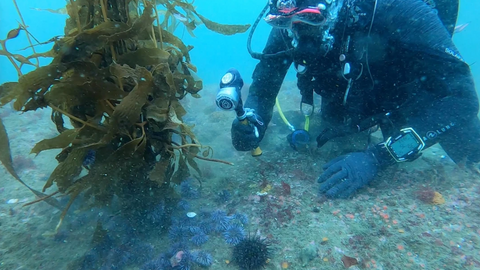Why Kelp is the Key to Solving Ocean Acidification

Our oceans are home to some of the most complex ecosystems on our planet and provide a number of important services. Unfortunately, human activity is disrupting these vital ecosystems. The ocean provides us with a number of important services. One of the greatest threats to these services is ocean acidification. Ocean acidification refers to the increasing acidification of seawater as a result of excess carbon dioxide dissolved in the ocean.

Source:https://oceanservice.noaa.gov/facts/why-care-about-ocean.html
Not only does the ocean serve as a resource for food, recreation, and transportation, it also serves as an important regulator for atmospheric carbon dioxide. Our ocean acts as a carbon sink, taking in about 30% of atmospheric carbon dioxide. When carbon dioxide mixes with water it creates carbonic acid. Carbonic acid can be further broken down into bicarbonate and eventually carbonate. 
Due to the role of the ocean as a carbon sink, the ocean naturally has the ability to respond to changes in pH. This ability is called buffering. 
This buffering ability is not without its downsides. By switching bicarbonate back to carbonic acid, less carbonate becomes available. Carbonate combines with calcium to form calcium carbonate which many marine organisms use to build their shells. This is resulting in marine organisms with weak or deformed shells.
Pteropods, small sea creatures who make calcium carbonate shells, after 0, 15, 30, and 45 days of exposure to acidic seawater.
source:https://www.pmel.noaa.gov/co2/story/What+is+Ocean+Acidification%3F
With the onset of the industrial revolution about 200 years ago, our ocean has been taking on larger quantities of carbon dioxide every year and the ability of the ocean to buffer against these changes is being exceeded. According to NOAA, this has made the ocean more acidic by 0.1 pH unit which represents a 30% increase in acidity. These increases in acidity are leading to adverse effects on ocean food webs, ecosystems, and the ecosystem services that the ocean provides.
Source: https://cdn.britannica.com/82/152182-050-719F9121/state-diagram-carbonates-conditions-oceans-2100.jpg
Some of the most critical ecosystems that ocean acidification is threatening are coral reefs. Hard corals build their skeletons out of calcium carbonate, so the increased ocean acidity means that their skeletons are deformed and weak. Evidence also shows that corals may undergo coral bleaching when the water becomes too acidic. While bleaching events do not necessarily kill the coral, it will leave them stressed and far more likely to die. Coral reefs serve as important habitats for many fish and as shoreline protection for coastal communities. A loss of these vital ecosystems will be catastrophic for the organisms who live there and the coastal communities that rely on them.

Left: a healthy thriving coral reef ecosystem. Right: a coral reef ecosystem affected by coral bleaching
Source: https://bethesdagreen.org/wp-content/uploads/2018/03/2.png
One of the major ecosystem services that the ocean provides humans is food. As the ocean becomes more acidic, fisheries are already experiencing stress. This stress is especially felt by shellfish fisheries because shellfish make their shells out of calcium carbonate. These fisheries serve as the backbone of many coastal communities. The decline of these fisheries will not only have severe environmental consequences, but also economic and social consequences.

Source: https://www.epa.gov/ocean-acidification/effects-ocean-and-coastal-acidification-ecosystems
What can we do about it?
In addition to being incredibly productive ecosystems, kelp forests are one of the best solutions to reducing carbon dioxide in the oceans. Kelp undergoes photosynthesis and absorbs carbon dioxide from the water. Reducing the amount of carbon dioxide in the ocean should make conditions less acidic. In addition to reducing ocean acidity, kelp has other numerous benefits to the environment including mitigating coastal erosion and providing a habitat for marine organisms.
Source: https://u4d2z7k9.rocketcdn.me/wp-content/uploads/2020/05/Webp.net-resizeimage-97.jpg
At 12 Tides, our puffed kelp chips are made with sustainably raised and harvested kelp from regenerative ocean farming operations. In addition to this, 12 Tides partners with SeaTrees, an organization committed to ocean conservation projects around the world. In Palos Verdes, California, SeaTrees has restored more than 50,000 sq ft of the Giant Kelp Forest. In addition to restoring kelp forests, SeaTrees also protects existing kelp forests by managing urchin populations. This work is vital to reducing ocean acidification and restoring critical ocean ecosystems. At 12 Tides, we could not be prouder to support SeaTrees in the crucial work they are doing to repair our oceans.
If you are looking for ways you can personally support kelp forests, here are 4 easy steps you can take today.
- Make a donation to SeaTrees or another organization restoring kelp forests.
- Buy from companies actively working to support this work like 12 Tideas and 4ocean.
- Be mindful of pollution ending up in oceans that threatens these ecosystems (avoid plastic)
- Commit to eating only sustainable seafood. Check out the Monterey Bay Aquarium’s Seafood Watch Program to make more sustainable seafood choices.
Source: https://sea-trees.org/blogs/in-the-news/paradigm-shift-on-how-to-restore-kelp-forests
Sources:
https://www.epa.gov/ocean-acidification/effects-ocean-and-coastal-acidification-ecosystems
https://www.noaa.gov/education/resource-collections/ocean-coasts/ocean-acidification
https://www.pmel.noaa.gov/co2/story/What+is+Ocean+Acidification%3F
https://www.pbs.org/video/pbs-newshour-coral-reefs-die-as-ocean-temperatures-rise-water-acidifies/
About the Author: Emma Gamble is a junior at the George Washington University majoring in Environmental Studies and minoring in public policy. Emma is passionate about incorporating greater sustainability into our food systems in order to create a greener future for people and the planet. Emma enjoys sailing, kayaking, and paddle boarding.
- Tags: Ocean Ecosystems





